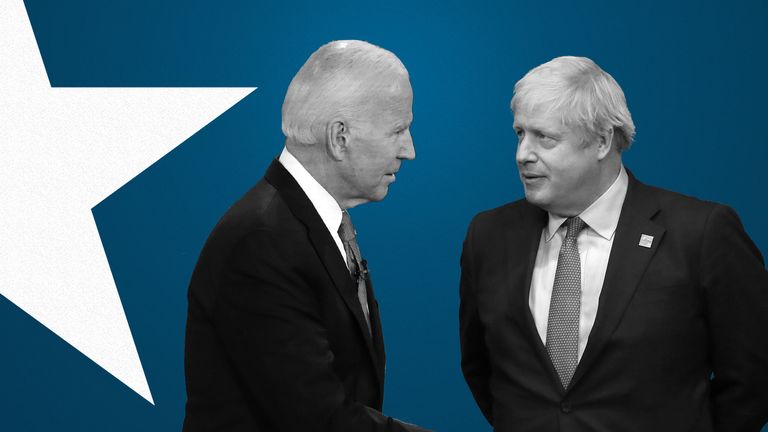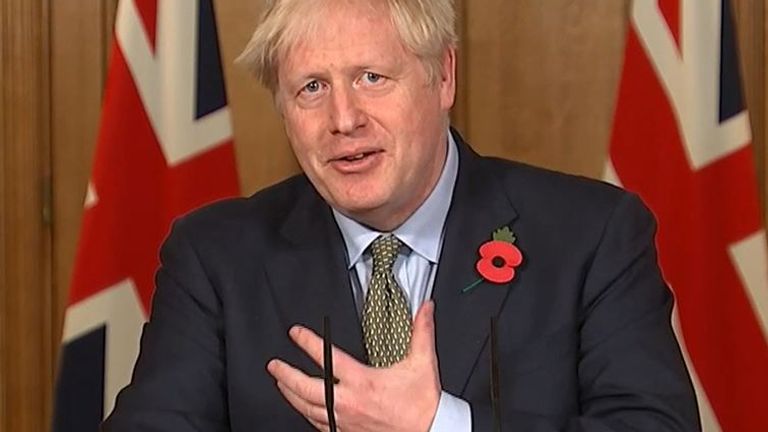Boris Johnson and Joe Biden are not, on the face of it, easy bedfellows.
While Donald Trump was a Brexit-backing, Boris Johnson back-slapping president, the man about to take over has made it very clear he's not a fan of either the current occupant of Number 10 or the policy that propelled him to victory in 2020.
A self-proclaimed Irish American, president-elect Biden is anti-Brexit and has taken a dim view of the UK government's attempts to override parts of the Withdrawal Agreement relating to Northern Ireland.
It makes for a very different backdrop to UK-EU trade talks which both sides insist need to conclude - trade deal or no trade deal - in the coming days.
But will it change the manner with which negotiations play out in the closing stages?
The EU side believes it will. One diplomatic source told me last week a Biden win will "put a squeeze" on the UK, as the prospect of a UK-US trade deal disappears even further from view while normal service resumes between Washington and Brussels.
As for the UK side, sources in Number 10 and the Foreign Office have been at pains in recent days to insist that the incumbent in the White House is not a consideration in the negotiations.
As one insider put it to me this week: "To those in the EU who think the Biden result changes Number 10's point of view, they won't be giving it a second thought. We're very clear we have got to secure a deal that we can live with at home and aboard."
Or to put it in the words of another senior figure familiar with the negotiating team: "For David Frost [lead negotiator], Oliver Lewis [policy adviser] and Dominic Cummings [chief adviser] leaving the EU is a lot about taking back sovereignty. It's not about being told by the US what they want us to do, so I don't think it will change the approach."
And so far it absolutely hasn't.
Take the legislation that overrides part of the Brexit deal on Northern Ireland, the UK government is pressing ahead with that legislation in the face of opposition from Dublin, Brussels, the House of Lords and now Washington.
The president-elect has made no secret of his opposition to the bill, while Democrats have been putting pressure on the British government to drop contentious clauses in the bill citing concerns that it could undermine the Good Friday Agreement (a charge the UK government vociferously rejects).
The Democrats have been clear that there will be no US-UK trade deal if Mr Johnson pushed ahead with the plan.
But the UK government is so far resisting.
It intends to reinsert the clauses voted down by the House of Lords back into the bill and may even keep these clauses in the Internal Market Bill in the event of a Brexit deal with the EU as an "absolute fallback" - despite the Biden team, European Parliament and Dublin all having deep misgivings.
And beyond Brexit, there are other personal political hurdles to jump in the coming weeks and months between these two men.
The pair have yet to meet, but first impressions have not been positive.
Mr Biden labelled Mr Johnson "a physical and emotional clone of Donald Trump" after the 2019 general election.
There have also been reports that the Biden camp has not forgotten Mr Johnson's suggestion in 2016 that President Obama may have "an ancestral dislike of the British empire" due to his "part-Kenyan heritage".
:: Subscribe to Sophy Ridge on Sunday on Apple podcasts, Google podcasts, Spotify, Spreaker
Indeed, when Mr Johnson tweeted congratulations to Mr Biden over the weekend, former press spokesman for President Obama Tommy Vieto said: "This shapeshifting creep weighs in. We will never forget your racist comments about Obama and slavish devotion to Trump."
While government insiders privately admit the politics of this relationship could be bumpy at the outset, when it comes to policy, a Biden White House is a better outcome for the UK than another four years of Trump.
"The vast majority of [us in government] would have preferred the result we got," is how one of Mr Johnson's team described it.
On security and intelligence, climate change, and the support for multi-lateral institutions such as the World Health Organisation and NATO, the Biden administration is more closely aligned with the Johnson one.
And it is the common ground that the prime minister's team was anxious to highlight after the two men - who have never met - had their first phone call on Tuesday evening.
In the readout of the call, Downing Street highlighted "shared priorities, from tackling climate change, to promoting democracy, and building back better from the coronavirus pandemic".
The PM invited the president-elect to attend the COP26 climate change summit that the UK is hosting in Glasgow next year.
There was no mention of Brexit on the No 10 read-out - although No 10 confirmed after the call that the two men talked about the "importance of implementing Brexit in such a way that upholds the Good Friday Agreement".
Irish PM Micheal Martin meanwhile was more explicit, tweeting out that the president-elect had "underlined his commitment to the Good Friday Agreement" in their telephone conversation.
What does it all add up to? A number of senior government sources have told me that the UK government's Brexit strategy stays the same, but some senior politicians also believe what could well change is the impetus in these final days of negotiations against the backdrop of a more stable world order.
One tells me they think the Biden win makes an EU-UK deal "more likely" while another says they believe a deal is now "more viable" as both sides adjust to a more predictable US and the "distraction" of a Trump White House and US trade deal falls from view.
And there is a broader point in all of this too as Mr Johnson builds his vision of post-Brexit global Britain.
Success in driving through climate change requires the help of our closest ally. It is the UK's self-interest to be on good terms with the new team in the White House.
The cleanest way through this is to get a deal with Europe, and the fact Michel Barnier is in London now and Mr Frost is due to go to Brussels towards the end of the week gives cause for cautious optimism that the two sides could reach a compromise.
Securing a deal would be a win-win for a prime minister who promised an "oven-ready" Brexit and is now dealing with a very different White House.
But it has to work for his domestic audience too - that requires some movement too from the EU with time fast running out.





